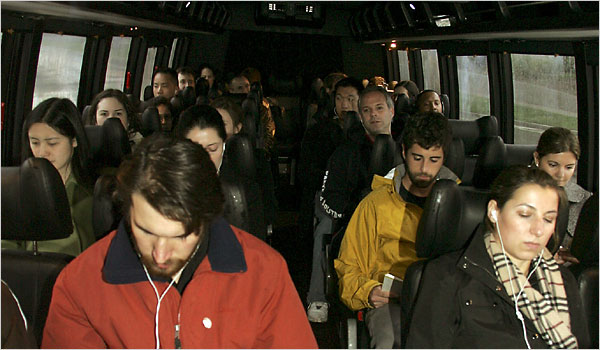
Google’s Shuttle is one of the more enviable perks the search giant offers its employees traveling from San Francisco to Mountain View and other locations. Not only are the rides free, they’re WiFi enabled.
Now other companies can offer such a fringe benefit to their employees with the help of RidePal, a San Francisco-based start-up founded by former Googler Nathalie Criou, who rode the Google Shuttle for five years.
RidePal is part of the latest Greenstart class of start-ups launching Wednesday in front of some 200 investors at Greenstart’s Demo Day, held in San Francisco. RidePal is one of the many companies emerging to take advantage of the crowd-aggregating trend that’s really cutting across industries to help more cost-effectively balance supply and demand. In this case, RidePal is using complex algorithms to aggregate demand for rides in order to better utilize transportation.
Criou is no stranger to complex algorithms, having worked at Google’s Admob. Her team also consists of Ward Thomas, who is an ex-Bauer project manager. Bauer is the company that put Google’s shuttle program together.
“If you don’t live next to a Bart or Cal station, it’s very hard to commute [especially across cities],” said Criou, in an interview. But offering bus services can be expensive for small and large companies alike. A 15 to 18 seater bus can run $10,000 a month, said Crio. Even if you fill the bus with 15 people for a round-trip commute 20 days out of the month, there’s still a lot of idle time. Add on top of this cost a logistics team to help manage the buses and routes, offering this kind of perk can be an expensive proposition.
But in the competitive and cutthroat environment, particularly in Silicon Valley, where providing perks is often critical to attract employees, companies may not have any choice but pay the expense.
RidePal can help companies with that expense by shaving off about 50% to 60% of the cost, depending on the plan they choose. RidePal offers companies three plans they can then offer to their employees for free or subsidized.
The first plan is a pay-per-ride plan. This is good for companies that have scattered employees. The second plan is a pay-per-seat plan, designed for companies with a concentration of employees in a particular area. The third plan allows companies to choose either the per-seat or per-ride rate. There’s also a subscription option for the third plan, should the employer want to provide additional perks to employees, like allowing them to get reimbursed for emergency rides. These plans all vary in price, depending on multiple factors, including distance.
A typical cost for a per-ride plan from San Francisco to Mountain View could be $10. For a round trip plan, that’s $20 a day, or $100 per week. If a company pays for 15 employees, that’s only $1500 a week, or $4000 a month vs renting a bus for $10,000 a month.
Additionally, RidePal offers companies a lot of flexibility. If a company just wants to subsidize the plan and not pay in full, RidePal can keep track of the services and usage and bill both the company and employee separately. Employees can get a card to keep track of their usage and they get access to a RidePal account online to buy more rides.
RidePal doesn’t own any buses. Rather it rents them from Black Tie Transporation and El Camino Trailways. At the moment, RidePal doesn’t get any discounts, because the team is focusing on aggregating demand, said Criou. They’ll work on the supply side of the equation once they hit critical mass.
As part of Greenstart’s Demo Day, RidePal is also announcing that it just landed Solar City as a premium customer. Solar City signed up for a per-seat for 90 to 180 days.
(Image source: graphics8.nytimes)















